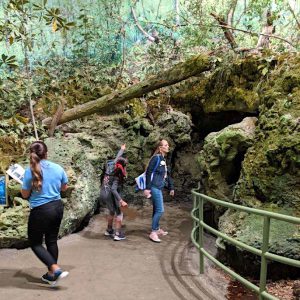Trista Brophy, a doctoral student studying Interdisciplinary Ecology in the UF/IFAS School of Natural Resources and Environment, recently completed a National Geographic’s Educator Certification Program. Brophy participated in the 30-hour program during the spring semester. She is now certified to implement scientific lesson plans using the National Geographic Learning Framework.
Brophy explained the framework helps shape the mindset of an explorer by engaging attitudes of curiosity, responsibility, and empowerment; developing skills of observation, communication, collaboration, and problem-solving; and building knowledge about the human journey, wildlife, and our changing planet.

The program had three phases. Phase 1 explained the framework to participants who then had to complete several virtual workshops and plan two lessons.
“In Phase 2, I implemented the lessons with my middle-school-aged siblings and completed reflections on how to improve the lessons,” Brophy said.
Implementing Lessons
The first lesson was on Urban Watersheds and included a short video on Florida Watersheds.
“We then walked the neighborhood and they made observations about potential pollutants and noted pervious and impervious surfaces,” she said. “Then we took a field trip to La Chua Trail at Paynes Prairie (Preserve State Park) where they learned about the watershed basin and the Alachua Sink.”
They also completed a project journal identifying as many wetland animals as they could and answering several questions.
“The second lesson was on Florida Waterways,” Brophy continued. “For this, I took my students to the Florida Museum of Natural History where they completed a scavenger hunt in the Northwest Florida: Waterways and Wildlife exhibit. This lesson focused heavily on the water cycle and human interactions with each ecosystem in the exhibit.”
Self Reflection
Phase 3 required Brophy to complete assignments in storytelling and create a short video of the experience.
“This educator program prepared me for generating classroom and field trip activities that are interdisciplinary and centered around real-world problems at local, regional, and global scales to help students of any age develop an explorer’s mindset,” she said. “It has also prepared me to advise on content and programming, lead National Geographic training, and serve as a mentor to other informal or formal educators.”
“Scientific communication is more important than ever and now I am equipped with new tools, skills, and knowledge to help build a better foundation of scientific understanding through any communication, education, and outreach activities I get involved with,” Brophy added.
You can view the short project video Brophy made for the educator program here: https://youtu.be/6lQE5EoAF78
 0
0
